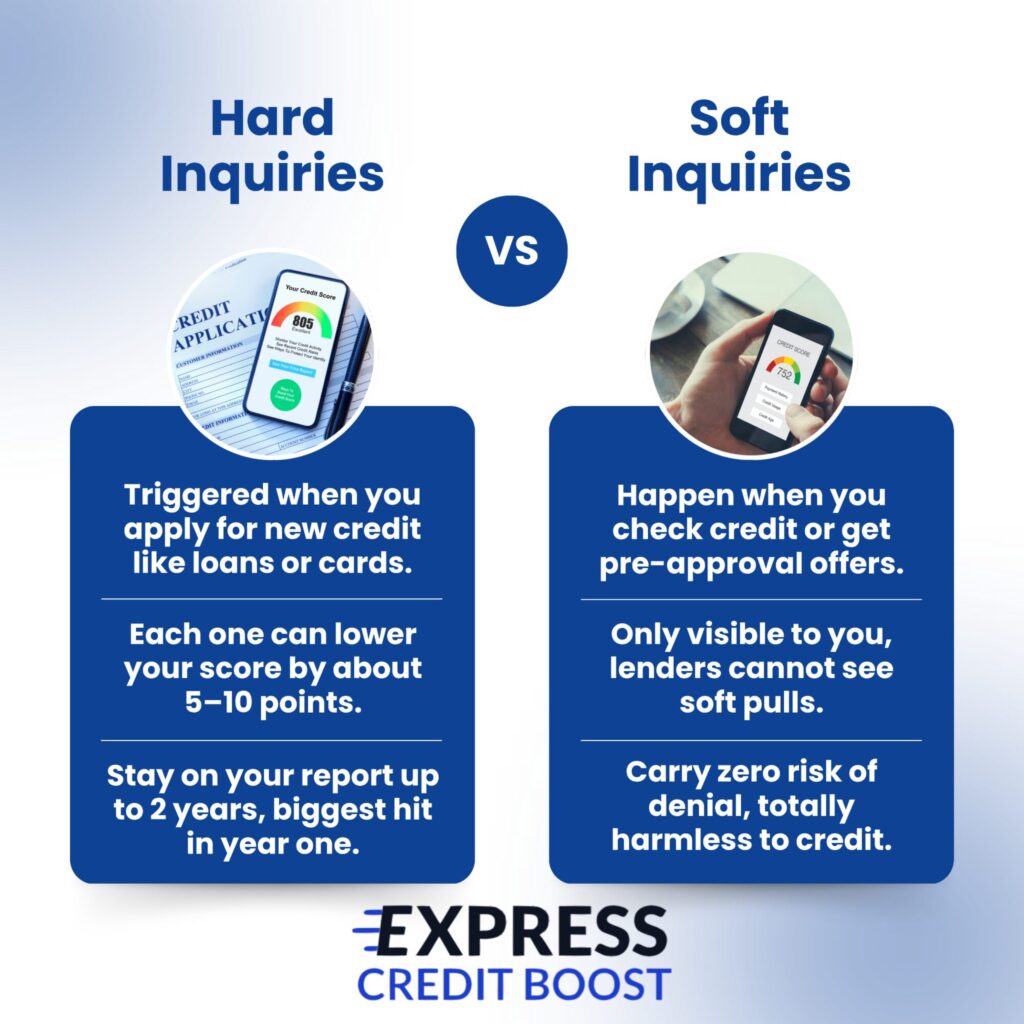Soft inquiries check your credit without affecting your score, while hard inquiries can lower it by a few points and are visible to lenders. Managing them wisely is key to protecting your financial opportunities.
Here’s what you need to know at a glance:
- Soft inquiry: No impact on score, invisible to lenders
- Hard inquiry: Lowers score, visible for two years
- Clusters matter: Multiple hard pulls can block approvals
- Consent required: Hard pulls need your permission
Understanding how inquiries shape your credit is essential.
Whether you’re preparing for a mortgage, applying for a business loan, or just protecting your score, mastering them can save you money and stress.
By the end of this guide, you’ll know how to recognize these inquiries.
You’ll also learn how to manage, dispute, and avoid them, giving you full control over one of the most overlooked parts of your credit health.
Soft vs Hard Inquiries: How They Differ on Five Crucial Fronts

Both types of inquiries involve your credit report, but their effects and visibility are very different. To make the difference crystal clear, let’s break them down across five important areas.
Impact on Credit Scores
The way an inquiry affects your score is the first major difference to understand. It determines whether the action is harmless or whether it lowers your credit standing.
- Soft Inquiry: Has no effect on your credit score, even if repeated multiple times.
- Hard Inquiry: Can lower your score by 3 to 5 points each, and several in a short period suggest higher risk.
This is why one or two hard pulls may be fine, but a cluster can create problems.
Visibility to Lenders
Who sees the inquiry plays a major role in how it impacts your borrowing chances. Some inquiries remain private, while others are part of your public credit history.
- Soft Inquiry: Visible only to you when reviewing your credit report.
- Hard Inquiry: Visible to all lenders and stays on your report for up to two years.
Because lenders can see hard pulls, they often carry more weight in decisions.
Purpose Behind the Pull
The reason behind an inquiry explains why one is harmless while the other is treated more seriously. Each type serves a distinct role in the credit system.
- Soft Inquiry: Used for preapprovals, background checks, insurance quotes, or personal credit checks.
- Hard Inquiry: Tied to new credit applications like mortgages, auto loans, and credit cards.
This difference is why lenders view soft pulls as informational but hard pulls as intent to borrow.
Information Returned
The type of score and detail provided in a credit check can vary depending on the inquiry. This creates a gap between what you see and what a lender sees.
- Soft Inquiry: Returns “educational” scores, often seen on credit apps, with limited details.
- Hard Inquiry: Provides lenders with commercial FICO scores and “reason codes” explaining risk factors.
This explains why your own score sometimes doesn’t match what lenders use in decisions.
Consumer Consent and Regulation
Finally, how an inquiry is authorized matters for consumer protection. The law treats soft and hard pulls differently when it comes to consent.
- Soft Inquiry: Can happen automatically, such as preapproved offers or account reviews.
- Hard Inquiry: Requires your explicit consent, with stricter regulations in some states.
This ensures you are always aware when an application could affect your credit score.
These five fronts make the differences between soft and hard inquiries easy to see. Next, we’ll explore why hard inquiries carry such weight with lenders and often act as warning signals.
Why Hard Inquiries Send a Warning Signal to Other Lenders

Hard inquiries are not just minor credit score deductions. They function as signals that lenders interpret when deciding whether to extend your credit.
To understand why they matter, it helps to see how they broadcast your activity to the financial system.
A Public Broadcast of Credit-Seeking
When a hard inquiry appears on your report, it tells every lender that you are actively applying for credit. This visibility is why lenders weigh them more seriously than soft pulls, which remain hidden.
Even one or two can spark questions, depending on the timing.
Red Flags from Clusters of Inquiries
Multiple hard pulls in a short window may suggest financial strain or desperation.
Even if you are simply shopping for a car or comparing credit cards, the system does not always interpret it that way. To lenders, a cluster of inquiries can look like risky borrowing behavior.
Shotgun Applications from Auto Dealers
Car dealers often send your application to numerous lenders at once, generating 10–15 inquiries in a matter of hours.
While scoring models may group these together, many lenders reviewing your file still see a flood of applications and may view it as a warning sign.
Errors in Reporting
Credit bureaus process billions of records each month.
Mistakes are inevitable, and sometimes an unauthorized or duplicate inquiry ends up on your report. These errors can hurt your chances even if your credit behavior has been responsible.
Hard inquiries are more than small score drops, they are part of a signaling system lenders rely on to judge your intentions.
Next, we will focus on when it makes sense to challenge or remove inquiries that should not be on your report.
When You Should Fight Back: Removing the Wrong Hard Inquiries

Not every hard inquiry is legitimate, and some can create unnecessary barriers to credit approvals. Knowing when and how to challenge them is an important part of maintaining a strong financial profile.
Fraud and Unauthorized Activity
Sometimes an inquiry shows up even though you never applied for credit. This can happen with identity theft or data errors.
- Action: If you do not recognize an inquiry, dispute it immediately and check for new accounts you did not open.
Unauthorized inquiries are not only harmful to your score but may also indicate larger security risks.
Errors and Bureau Mistakes
Credit bureaus handle billions of data points, so mistakes are common. A duplicate inquiry or one tied to an incorrect lender may unfairly lower your score.
- Action: File a dispute with the bureau to have these corrected or removed.
Even small errors can cost you in interest rates or loan approvals.
High-Stakes Situations
Hard inquiries matter most when you are preparing for a mortgage, business loan, or major line of credit.
Experian, in particular, plays a key role in business financing, so removing unnecessary pulls can make or break approvals.
- Action: Review your report before applying for any large loan and clear out questionable entries.
This ensures you present the strongest credit profile possible to lenders.
DIY vs Professional Help
You can dispute inquiries yourself, but the process often requires 10–20 pages of legal filings and mailing costs for each bureau.
Many prefer professional services to save time and increase the likelihood of success.
Hard inquiries that are fraudulent, erroneous, or poorly timed should not hold you back.
Next, we will explore practical strategies to prevent inquiry problems in the first place and keep your credit profile strong over time.
Smart Strategies to Keep Your Credit Score Safe From Inquiries
While hard inquiries are sometimes unavoidable, the way you manage them makes all the difference.
By adopting a few smart habits, you can protect your score and reduce the risk of unnecessary damage.
- Use Prequalification First: Whenever possible, check if a lender offers prequalification. These use soft pulls, letting you gauge eligibility without risking your score.
- Space Out Applications: Avoid applying for multiple credit cards or loans at once. Spreading applications over time reduces the appearance of credit desperation.
- Leverage the Rate-Shopping Window: FICO scoring models group similar loan inquiries within 14 to 45 days into a single hard pull. Use this window wisely for mortgages, auto loans, or student loans.
- Monitor Your Reports Regularly: Check your credit reports monthly to catch unauthorized or duplicate inquiries. If you see something suspicious, consider placing a fraud alert or credit freeze.
- One Hard Pull Isn’t Fatal: A single inquiry is rarely a deal-breaker. The real problem is clusters of them, which can suggest higher borrowing risk to lenders.
- Ask Before Applying: Always confirm with a lender whether they will use a soft or hard pull before submitting an application.
By treating inquiries with the same care as payments or balances, you maintain control over your score.
Next, we’ll tie everything together and show how mastering inquiries can strengthen your entire financial profile.
Mastering Inquiries to Master Your Credit

Credit inquiries may seem like small details, but they play an outsized role in shaping your financial opportunities.
Soft pulls are harmless, meant for informational purposes only.
Hard pulls, on the other hand, are signals, visible to every lender, that you are actively seeking credit.
Too many of them in a short period can delay approvals, raise interest rates, or even block access to a mortgage or business loan.
The good news is that unfair or unauthorized hard pulls can often be challenged and removed, restoring lost points and improving approval odds quickly.
By staying proactive, spacing out applications, using prequalification, and monitoring reports, you maintain control over how inquiries affect your financial path.
If unwanted inquiries are standing in your way, start today with Express Credit Boost’s 24-hour Experian inquiry removal service, proven to deliver fast, reliable results that help you move forward with confidence.







